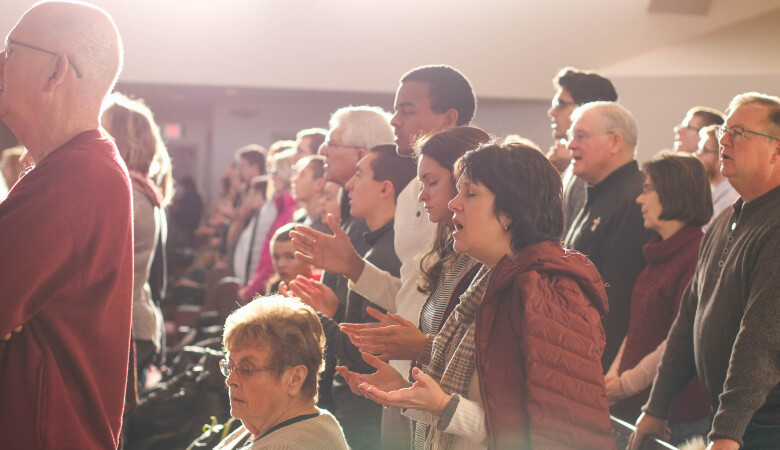If the Lord Wills, You Will Live (James Sermon 9)
March 08, 2020 | Andy Davis
James 4:13-17
Works of the Flesh, Walk by Faith, Revival, Providence and Sovereignty of God
Introduction
Jonathan Edwards and the Great Awakening
Amen. So turn in your Bibles to James 4, continue our study in James, incredible book, so convicting and so powerful. In April of 1734 the greatest revival of the Christian religion, arguably in church history began in a quiet hamlet in Western Massachusetts where Jonathan Edwards was pastor of a small church in Northampton. And it began in that community for that time, with a shocking event, the sudden death of a teenage boy. And Edwards spoke about that. “There happened a very sudden and awful death of a young man in the bloom of his youth who being violently seized with a pleurisy, and taken immediately very delirious died in about two days. Which together with what was preached publicly on that occasion much affected many young people." Edwards biographer, George Marston, says this, "Jonathan Edwards’ whole life had prepared him to seize this moment. Having been twice on the verge of death himself in his teenage years, he had spent much of his own youth reflecting on the folly of loving earthly pleasure when on the brink of eternity." Edwards preached the funeral sermon for that young man from the text in Psalm 90:5-6. “In the morning they are like grass which groweth up, in the morning it flourisheth and groweth up; in the evening it is cut down and withereth.” That's the text that he preached. And this poignant sermon brought many of the friends of the dead young man to tears. Edwards went on, at length, with the experiences many of them had had of walking through a field of wild flowers, which look beautiful but which soon wither.
Recently I was in a beautiful mountain area in Europe and I saw these vivid purple flowers. And I wanted to bring a small bunch of them home to my wife, so I picked them and brought them to my hotel room. That evening I couldn't recognize them, I actually didn't know the color, so I threw them in the trash and my wife never knew anything about it. Sorry hun, that I didn't bring you your flowers, but they were withered within hours. And so it is these young people at this funeral had this sense of walking through a field of wildflowers and perhaps they've even picked them and had the same experience I had within hours.
He then turned from that image to warn the youth of Northampton against squandering their lives in the pursuit of worthless things. This is in the funeral message. He said this, "Consider, if you should die in your youth how shocking would the thought of your having spent your youth in such a manner be to them that see it. When others stand by your bedside and see you gasping and breathing your last, or come afterward and see you laid out dead by the wall and see you put into the coffin, and behold the awful visage which death has given to you, how shocking will it be to them that think, 'This is the person that used to live so vain and frothy a life. This was he that was so lewd a companion. This is he that used to spend of his time and his leisure hours in so much frolicking.'" He then concluded this funeral sermon very sweetly. "If you have gained an interest in Christ by faith,” that means become a Christian, “if you have gained an interest in Christ, your body shall flourish again, in a glorious manner. If you should die in the flower of your days when the body is most attractive and beautiful, it will actually rise again a thousand times more attractive and beautiful. Your happiness would be far greater than that of simply being fondly remembered for a time. Your glory will last forever."
Well, Edwards used this occasion to gain a foothold in the lives and hearts of the young people in Northampton, and to minister the Gospel to them deeply and widely. Over the next few weeks they would gather together in small groups to pray, and it wasn't long before many of them were savingly converted. This was the beginning of the Great Awakening. Right there in Northampton, it transformed the youth culture in that town, and it was soon spreading to many other communities around. And when he wrote about it, and it was published in England it kindled similar effects in that country and it began to cascade around the English-speaking world.
I. Salvation: Rescued from Being the Master of Your Fate
Invictus
Now, this morning's text tells us that “our lives are a mist, a vapor that appears for a little while and then vanishes.” And therefore the wisest thing that any of us mortals can do is flee to Christ while there's time. To come to Christ for the forgiveness of our sins for eternal life. And I believe a good way to look at salvation is mirrored in the attitude of the text. It's being rescued from being the master of your own fate and the captain of your own soul. This phraseology came from a different kind of man than Jonathan Edwards. In 1894 William Ernest Henley lost his precious six-year-old daughter, Margaret. And in his grief and anger, he rather defiantly wrote a poem called “Invictus”, which means I have not been conquered. And this is what he wrote, "Out of the night that covers me, black as the pit from pole to pole, I thank whatever gods may be for my unconquerable soul. It matters not how strait the gate, how charged with punishment is the scroll, I am the master of my fate, I am the captain of my soul."
Well, the essence of the rebellion of the human race against Almighty God is autonomy. That word literally means “self-rule.” Being the master of your own fate and the captain of your own soul. You can determine therefore what you will be and what you will not be. Where you will go, what you will do with your time, you'll decide all that for yourself, and how long you will live. So there's an essential arrogance and defiance about all that, about autonomy. One of the key ingredients to this human self-rule, this autonomy, is presuming upon tomorrow. Presuming upon tomorrow. Assuming that we will be alive tomorrow, and in the text, even a year from now, just assuming that we'll be alive. And that if we'll be alive a year from now, we get to choose to do whatever we want with our time on earth, and whatever we want in whatever city we go to. We get to make that decision. That's what autonomy is all about. We see it in our text.
Saved from Autonomy
Now when our Lord and Savior Jesus Christ saves a sinner, He saves that sinner out of autonomy. He actually comes and takes our stiff necks and puts them under his kingly yoke, under his kingly rule. And we, by the transforming work of the Spirit, consider that the greatest thing that has ever happened to us, that we've been delivered from being masters of our own fates and captains of our own souls. We actually have repented for the kingdom of Heaven has come near, Mark 1:15, that's how Jesus began His preaching ministry, "Repent, the time has come, the Kingdom of God is near." He didn't say these words, but he could have. And at the center of the kingdom of God is God the king. So repent and believe the Gospel, believe the good news. And as he says, so sweetly in Matthew 11:28-30, “Come unto me all you who are weary and burdened and I will give you rest. Take My yoke upon you and learn from me, for I am gentle and humble in heart, and you will find rest for your souls. For my yoke is easy and my burden is light.” For many years I didn't understand what that yoke was all about until I did a biblical word study and found that when it wasn't a literal physical piece of wood, put across the necks of beasts, it was generally a metaphor for kingly rule. Again and again, kingly rule, and Jesus is saying, "Take my kingly rule upon you and learn from me. You have been serving another king, a wicked tyrant, Satan who flogs you and beats you, but I'm here to break and shatter that yoke off your shoulders and put another yoke on you.” Not no yoke, that's the lie from Satan. "You have no yoke on you, you're free." No, you're not. But you will find if you take your stiff neck, and yield to me and submit to me and put my yoke upon you, you'll find rest for your souls, and you'll find that my yoke, my kingly rule is easy, my burden is light. That's salvation. And therefore, we learn to say that God the creator, God the king, God the law giver, God the judge, he's the center issue of my life and all that matters is His will. That's it. What is the will of the Lord for me in my brief time here on Earth? The Lord then brings a serious consideration every day of the best use of our time and our energy and our money and our gifts and all of that for His glory.
Be Wise and Redeem the Time
Wisdom then very much consists of making a wise improvement of our time and of the opportunities that we enjoy. This is often spoken of in scripture, a great part of wisdom. Deuteronomy 32:29 “O, that they were wise that they understood this, that they would consider their latter end." Wisdom is to know where you're going, where is all this heading? Or again, Psalm 90:12, “Teach us to number our days properly that we may gain a heart of wisdom.” Or as Ephesians 5 says, "Be very careful then how you live. Not as unwise, but as wise, Redeeming the time because the days are evil, therefore, do not be foolish, but understand what the Lord's will is." It's the same concept as the text we're looking at today. So that's what this text is about. Being saved from autonomy, self-rule, being saved from being the master of your fate, the captain of your soul, and learning to be wise about the fleeting time that we have here on earth, and the centerpiece of that wisdom is learning to say, "If the Lord wills, I will live, and if the Lord wills I will do this or that."
II. The Arrogance of Presuming Upon Tomorrow
Prideful Assurance About What is Uncertain
Okay, so let's walk through the text, let's begin with the concept, the arrogance of presuming upon tomorrow, we'll look again at the words. James 4:13-17, “Now listen, you who say, ‘Today or tomorrow we'll go to this or that city, spend a year there, carry on business and make money’ while you don't even know what will happen tomorrow. What is your life? It is a mist that appears for a little while and then vanishes. Instead, you ought to say, ‘If the Lord wills, we will live and do this or that.’ As it is, you boast and brag. All such boasting is evil. Anyone then who knows the good he ought to do and doesn't do it sins.” Alright, so we're picturing here, perhaps a businessman a merchant who travels a bit for his trade, goes from place to place, he's used to being prosperous and he's making plans for the future. And notice his attitude about the future. “Today, or tomorrow,” it doesn't matter, they're equally sure to him. “There's plenty of time. Actually, there's a limitless resource of time.” And notice his autonomous plans, "Well go to such and such a city, this city or that city, whatever I think is best. And we're going to spend a year there, and we're going to carry on business, we're going to make a trade and we're going to make a profit, we're going to make money, that's how it's going to go."
Notice that this individual goes far beyond certainty about tomorrow to certainty about a full year beyond tomorrow. The one is as certain as the other in this mindset. In all of his plans, the will of God never enters in, and think about it, he is the master of his fate, he is the captain of his soul. He will live as long as he wants to live, I guess and spend his time as he chooses. He is presuming on the future. Notice also verse 16, one translation says, "You boast and brag or you boast in your arrogance," is another translation. So there's an essential pride to all of this. The human being is pridefully forgetting about God, he is making his own plans, he forgets that his very existence is in the hand of God.
We Live and Die According to God's Will
Look at verse 15, “Instead you ought to say, ‘If it is the Lord's will we will live.’" Let me just pause right there and just say this is probably one of the most helpful things you can begin to say to yourself, every day. “If it is the Lord's will, I will live.” I don't think it'll do you any harm to say it multiple times a day. You don't have to say it to others. It will alarm them. Maybe they should be alarmed, I don't know, but you should be alarmed at least into “numbering your days properly that you may gain a heart of wisdom,” just say again and again, "If it's the Lord's will, I will live." This is biblical theology for Paul said in Acts 17, "In him [God] we live and move and have our being.” Colossians 1:17 says, "In him [Christ] all things hold together." The very atoms of your body are being held together by the ongoing will of Almighty God, whether you believe in him or not.
As Daniel the prophet said to the wicked king of Babylon, Belshazzar, who was holding a horrible, idolatrous, drunken feast, using the holy articles taken from the Holy of Holies in the temple, in Jerusalem, and using them to toast the gods of bronze, iron, wood, and stone. And then the hand, this mysterious hand appeared, and there was what we call, “he saw the writing on the wall,” comes from Daniel 5, and Daniel came in and said to this evil king, "’You did not honor the God who holds in his hand your life and all your ways.’ That very night, Belshazzar the Independent died.” So the arrogant man who presumes in the future forgets this one fact. Hebrews 9:27, “It is appointed to each one of us to die, and after that to face judgment.” Or again, Ecclesiastes 8:8, “No man has the power over the wind to contain it, so no one has the power over the day of his death.” It's not in your hand. You don't control it.
He also forgets that God is sovereign over the things that happen on his planet. He overrules every human decision for his own purposes and his own glory. Proverbs 19-21, "Many are the plans of a man's heart but is the Lord's purpose that prevails." So whether you believe in or not, God's purpose, every day, is being worked out providentially. So this arrogant person in the text boasts about something he doesn't possess, tomorrow. And he just goes out, and he's going to do what he's going to do. Now, I think James probably had this proverb in mind, Proverbs 27:1, "Do not boast about tomorrow for you do not know what a day may bring forth.” Sounds exactly like our text, doesn't it? “Do not boast about tomorrow for you don't know what a day will bring forth.” And why is this so foolish? Well, the boasting about tomorrow shows the independence from God, forgetting the transitory nature of our lives, forgetting how dependent on God, we are for our continued existence.
The Brevity of Human Life
And so James says it in verse 14. “What is your life? “It is a mist [or a vapor] that appears for a little while and then vanishes.” So our time here on Earth is extremely brief. God in judging the original sinner, Adam, said, "By the sweat of your brow, you will eat your bread until you return to the ground, since from it you were taken, for dust you are and to dust you will return." Nebuchadnezzar in Daniel 2 had a vision, a dream in which he saw a statue with a head of gold, chest and arms of silver, legs of iron, belly and thighs of bronze, legs of iron and feet partly and partly, clay. Those different metals represented different empires, four mighty empires. And then in the dream he saw all of them became like chaff on a threshing floor, and the wind blew them away without leaving a trace. That's four empires, the Babylonian empire, and the Medo-Persian Empire, and the Greek Empire, and the Roman Empire blown away without leaving a trace.
The Book of Ecclesiastes, one of the central themes, "Vanity of vanities, everything is vanity, it's meaningless," says the teacher. “What does man gain from all his labor, at which he toils under the sun? Generations come and generations go, but the earth remains forever.” Ecclesiastes 1:11, “There's no remembrance of men of old, even those who are yet to come will not be remembered by those who follow.” Ecclesiastes 1:14, “I've seen all the things that are done under the sun, and all of them are meaningless. They are chasing after the wind.”
So as I was meditating on this, "your life is a mist, it's a vapor," I was thinking about the parable of the rich man, you remember, whose fields produced a bumper crop and he had immediate logistical problem, “Where am I going to put it all?” “He didn't know what to do. He said, “Oh, I know what I'm going to do, I'm going to tear down my barns and build bigger barns and there I'm going to store all of my grain and my goods and I'll say to my soul, ’Soul, you have plenty of good things laid up for many years, take life easy, eat, drink and be merry.’ But God said to him, ‘You fool, this very night your soul will be required of you. Then who will get all the things you have prepared for yourself?’"
We ought to meditate in light of the text we're studying today on those words, “You fool, this very night your soul will be required of you [demanded of you.]” Friends, not requested, demanded of you. And when God demands your soul, you have no choice. You could be in the death throws and say, "I can't die, I was doing X." Does not matter what X is. "I had plans to do Y." Doesn't matter, when your soul is demanded you will die. And people die suddenly, all the time. They die of car accidents. Jonathan Edward's case, it was a pleurisy, a fever that came on two days later, dead, you know, it happens. The older you get, the more of those scenarios you hear about, or even are personally involved with with people we know. And so, we're aware of how individuals can go from prime health to sickness and then death very quickly. And even aside from immediate death, there is the process of aging, which comes on people faster than they think, and so, their capabilities get reduced. And then some injury or some other illness comes and then they're in physical rehab for a while and they never really quite return to that, and they never got back to their prime strength and health, and those days are quickly gone, in which we can energetically powerfully serve the Lord. So James wants us to be humbled by our transitory lives, by how brief our time here is on earth. We ought to realize every day that our life here as a mist, it is a vapor.
When I drive to work in the morning, every morning, I cross a body of water, it's a reservoir near my house. And there are some mornings that the atmospheric conditions, the sun, everything, there's a thick mist that floats up and kind of hovers there over the bridge and over the lake. And you cut through it, you drive through it and then if you have the opportunity to come back even within an hour, it's gone, it's been burned off by the sun. Now, you've had that experience, and that's what James says our life is, it's a mist, it's a vapor, it's brief. And so, as Moses said, "Teach us to number our days that we may gain a heart of wisdom." We don't know how long we have.
The Calendar of Our Lives
Let me just give you a kind of a geeky image that stuck with me from my engineering days. Bear with me. It's one of the prices you have to pay to have me as your pastor. So, we used to have, in the engineering department I worked at, we had this big ugly calendar of the whole year. And it was given to us by a hardware supplier. It's one of the ugliest calendar's I've ever seen. I like calendars with mountains and rivers and beautiful things, but this was a 3 x 4 matrix for the 12 months. January, February, March, April, May, June, etcetera. So there are 12 months, and I remember somebody got up with a red pen and put an X through the day we just did yesterday, so we're on the next day that doesn't have a red X in it. It was kind of depressing. And you're looking at it, and the red X is just making progress through the 3 x 4 matrix. And one day in my weird sort of way, I looked at it and I said, “Suppose that calendar represented my whole life, with January 1st being the day of my birth and December 31st the day of my death, where am I?” I don't know. I know what the actuarial charts say about where I am, okay. The average lifespan of someone in my condition, I know that, but, I don't know. And I'm never satisfied, I always push it to the next level. I wonder if that represents the day I began working at this company and December 31st the day I'll stop working at this company, where am I? Or parenting, the day that they're born and the day that they grow up and leave our home. Our days are numbered friends and they're brief and they fly by. And so the Gospel lifts our eyes above this present age to eternity, and it shows us that the world to which we are going is entirely different. Our eternal life is not a mist or vapor, not at all. It's eternal. And the world to which we are going, we will be there for all eternity. If you have trusted in Christ, it will be glorious and beautiful and radiant. If you have not, it will be eternal conscious torment, that's the Bible's doctrine of Hell. Flee the wrath to come.
III. What It Means to Presume Upon Tomorrow
Be Wisely Prepared
So, what do we mean by presuming upon tomorrow? Well, let's set up some boundaries, okay? It does not mean you shouldn't plan for anything. There's a big difference between saying, “I'm depending on, or relying on tomorrow for spiritual reasons, and I am preparing for a day, that may come, and I'm preparing wisely.” So the Scripture actually does commend that we prepare for the future. Proverbs 6:6, says, "Go to the ant you sluggard. Consider its ways and be wise. It has no commander, no overseer, or ruler, yet it stores its provisions in summer and gathers its food at harvest.” So I'm not arguing that you should sell all your possessions, buy a white robe, and sit on the roof of your house and wait for the second coming of Christ. Actually, in church history, some have done exactly that, and they eventually came back down and tried to buy back their things. So we are to live as though every day might be our last, but we're also supposed to prepare and store up for the future.
All missions are done this way. You prepare a mission trip, you don't say to the people going with you on the mission trip, we don't know where we're going or how we're getting there, but come. We're going to get on a plane, and who knows what'll happen. That, we don't do that. We plan short-term mission trips, career missionaries plan, they prepare, they get trained and that's appropriate. That's how we live in this world. And so we do prepare for the future, but there's a difference between preparing for the future, and presuming on the future. And so, the most important thing that you can do in hearing this is, be certain that you are born again, that you have trusted in Christ for the forgiveness of your sins. Don't put that off to another day.
Make Good Use of Today
You remember Felix had the greatest evangelist in church history incarcerated with him. He was imprisoning him, and he had access to him, and he took advantage of it. So he sat with Paul, the Apostle, the one who wrote the Book of Romans. “Do you know anything about the Gospel Paul?” “I know a lot about the Gospel. Let's talk about the Gospel.” And so, He discoursed with Felix about righteousness, self-control, and the judgment to come. And when Felix heard that, he became alarmed, and stopped him and said, "Stop. We'll talk about this at another time." Amazingly, God in His grace gave him another time, and actually many other times, maybe a year or more, maybe two. But in the end he never, as far as we know, repented and believed, and then handed Paul over to the next governor Festus and moved on. He put it off because he thought he would have more time. The Lord says to all of us, 2 Corinthians 6, “In the time of my favor, I heard you, and in the day of salvation I helped you.” Then Paul says, “Behold I tell you now is the time of God's favor. Today is the day of salvation.” Or again, the author to Hebrew says, “Today, if you hear His voice, do not harden your hearts.”
Repent and Serve God
So the wisest thing you can do then is hear this Gospel message, hear of the atoning work of Christ, here that all you have to do is believe and not by works, but by faith are all your sins forgiven and flee to Christ while there's time. For us as Christians we're stronger every day by people who think just like the person in this text. You know it's true. We go to work in secular places that people are basically thinking this. “We're going to do this, we're going to do that, etcetera,” and God never enters in. We're surrounded by people without hope and without God in the world. Our task in this Raleigh, Durham area, our task is to shine the light of truth into that darkness. So, I'm giving you kind of the talking points for tomorrow at work. Find some way to talk about the brevity of life. Find some way to talk to some lost person about their life is a mist, it is a vapor. Find some way. And then for you as Christians, put your own house in order. Put your own house in order.
Don’t Procrastinate
Is there something God wants you to do? You know there's something God wants you to do, do it. Do it. Don't wait. Some Christian people are postponing some spiritual aspect of their life, could be a sin pattern that they plan on repenting from and turning from, but they haven't yet. Or it could be a good ministry that God, they feel, is calling them to do, but they just haven't begun it yet, and they'll get to it, they plan of it, they have to arrange some things first. So we tend to do spiritual procrastination thinking we're going to have plenty of time in the future. And so, we procrastinate from addressing sins in our lives and from beginning positive, fruitful ministries that the Lord is calling on us to do. So, if you have a pulling, a magnetic pull towards some ministry, follow it, feed it, see where it will lay, don't postpone it. And if God is convicting you, if I say to you, "Is there some sin pattern by which you are violating your conscience?" And something pops in your mind right now, the Holy Spirit is convicting you right now, I don't know what it is. Don't delay repenting from it. Put it to death now, don't wait. But deal with it now. So, positively, if God's calling on you to do a ministry, don't delay, find out about it, take steps toward it, start doing it. Negatively, if there's some sin in your life, don't delay, repent. Put it to death.
IV. Application
Learn the Lord’s Will
Now, there's some practical things that I want to give you about this. I believe you should have a quiet time every day. You should get up and feed your soul in God's Word. And in so doing, you'll do what it says in Ephesians, “find out what the will of the Lord is,” find out what His will is. So, you should say, If the Lord wills, I will live and do this or that. Okay? So, I've already covered, If the Lord wills, I will live. So, in your quiet time, you say, “Lord, thank you that I have this day, this is the day the Lord has made, you have willed that I'd be alive, at least to this point. If you will, I will finish the day out. So I'm putting my life in your hands. It is yours.”
Secondly, if the Lord wills, I will do this or that. What are your plans? It's not wrong to have plans, but have you asked God for wisdom? Have you sought His face concerning your plans? Have you passed them by for his review? Have you said like Jesus did with the greatest single act of human courage there's ever been in history, “Not my will, but yours be done”? Jesus was exactly the opposite, he was saying to his father, If the Lord wills, I will die. And it was God's will that he died. And he was willing to drink that cup for us, that's how much he said, if the Lord wills, I will live and do this or that. So we follow after Him and say, if you will, I'll live for your glory. So what do you want me to do? And then, first and foremost, the Spirit speaks through his word, he's going to tell you what the Lord's will is. Just do a word study on, it is the will of the Lord to that, so that you be sexually pure, 1 Thessalonians, “that each of you learn to control his own body in a way that's holy and honorable, not in passionate lust, like the heathen, who do not know God.” So it is God's will that you be sexually pure and holy. So you can just go down. Find out, it is God's will, it is God's will that we serve Him with all of our time and our energy.
It is God's will that we ask him, “Should I go to this or that city? Should I spend a year there if you give me that time? Should I make money? And if I do make money, what should I do with it?” And so, there are some clear things that God says, it is His will, well we'll just find out what the Scripture says. But then there are some things that are pertinent to you, they're unique to your life and you don't know. “Should I leave this church and go to this city and take a job offer that I have now that I finished my graduate program, or if there's an opportunity, should I or not?” The Bible is not going to tell you directly what to do, but it does say in James 1, "If anyone lacks wisdom, he should,” what? “Ask God.” Ask God. Should I take that job? Should I marry that person? Should I go on that mission trip? Should I do this, Lord? And listen to him. “And when you ask, you should believe and not doubt that he'll speak into the quietness of your heart and lead you and guide you.”
Sins of Omission
Finally, the text ends with an important statement on a category of sin called sins of omission. We tend to focus on sins of commission, things that you do that you know God doesn't want you to do. You violate some law. But this says, “if anyone that knows the good he ought to do and doesn't do it, he sins.” So, God wants us to be lights shining in a dark place. I mentioned this a few minutes ago. He wants us to be evangelistic. But are you evangelistic? Are you sharing the Gospel with lost people? Is this a regular pattern of your life? These were his last words to the church before he ascended to Heaven. Read the end of Luke 24, you know exactly what I'm talking about. He said, share the Gospel to the ends of the earth and then He ascended. So, if you know what you ought to do and don't do it for you, it is sin. So for us, let's not procrastinate.
Is there a lost person in your life, somebody that you are focused on, somebody you're seeking to lead to faith in Christ? Don't wait, share the Gospel with them, be bold and see what God will do in and through you. Friends let's make the most of the time we have here as a church. Let's make the most of the days we have left together. Let's realize they're brief, they're fleeting, and let's live for the glory of God.
Preparing for the Lord’s Supper
Now we have an opportunity to prepare for the Lord's Supper. Let me say something about the Lord Supper. I believe that the celebration of this ordinance is an opportunity that we as believers in Christ have to encounter the living God. I do not believe in transubstantiation? I don't believe it actually becomes the body and blood of Jesus, neither do I take a bare memorial view, like we can't expect anything here. I believe that in proportion to our faith in the Word of God, we can have an encounter with the living God, prepare your hearts for it. You've already had the opportunity to confess your sin, but be mindful of the fact of any sins that you may have in your life.
If you are not yet a Christian, if you've not testified to saving faith through water Baptism, we ask that you refrain, that you refrain and just observe. But we pray that in later months that you may actually be able to partake with us. But if you are a believer and you've testified to it by water baptism, we want you to partake. So let me this close this sermon time in prayer, and then I'll ask the helpers to come and I'll read the words of institution. Let's pray.
Prayer
Father, thank you for the power of your word, thank you for the clarity of your word. Thank you for the insights that it gives us about the brevity of our lives. Thank you for the Gospel that saves us from eternity and not apart from you. I thank you for this church, and now, Lord, as we have the opportunity to not just having fed on God's Word by hearing it, but that we can partake in the actual elements we pray that you would be glorified and send forth your Spirit. Be with us as we celebrate now in Jesus' name. Amen.












